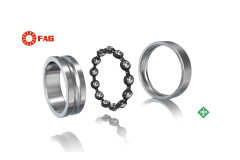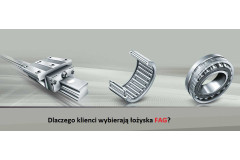
How to Choose the Right Radial Oil Seal for Your Application: A Guide to Materials, Sizes, and Factors Affecting Performance
Choosing the appropriate radial shaft seal (also known as an oil seal) for your specific application is crucial for ensuring the performance, reliability, and longevity of your equipment. Whether you are working in industries like automotive, heavy machinery, mining, or petrochemicals, seals play a critical role in protecting mechanical systems from leaks and contamination. Selecting the wrong product can lead to serious failures, costly repairs, and unnecessary downtime.
This guide will help you understand how to choose the best radial oil seal for your needs by exploring key factors such as materials, sizes, and performance parameters. We'll also highlight products from leading brands like GRN® and Corteco, known for delivering innovative sealing solutions for industrial and automotive applications.
1. Why Choosing the Right Oil Seal is Important?
Radial shaft seals (or rotary shaft seals) are essential in preventing fluid leaks and stopping contaminants from entering critical components in engines, pumps, and industrial machinery. These seals ensure optimal performance by protecting rotating shafts from damage caused by dirt, dust, moisture, and other external elements.
Operating under harsh conditions such as high temperatures, pressure, aggressive chemicals, or fast rotational speeds, seals must be selected with precision. Whether you're sealing a gearbox, water pump, or hydraulic system, choosing the right seal—like GRN® or Corteco oil seals—can save you from downtime and mechanical breakdowns.
2. Choosing the Right Material for the Oil Seal
The material of the oil seal directly impacts its performance in various working conditions. Below are some of the most commonly used materials and their characteristics:
NBR (Nitrile Butadiene Rubber)
NBR is a popular material for oil seals due to its excellent resistance to oils, greases, fuels, and most hydraulic fluids. Seals made from NBR, such as those from GRN® and Corteco, are ideal for temperatures ranging from -40°C to +100°C. These are the standard radial oil seals used in automotive and industrial applications, such as sealing crankshafts and pumps.
FKM (Viton)
FKM offers superior heat and chemical resistance. FKM seals can operate at temperatures up to +200°C and are resistant to acids, fuels, synthetic lubricants, and chemicals used in petrochemical industries. FKM seals are perfect for demanding applications in jet engines, turbines, and other extreme environments.
MVQ (Silicone)
Silicone (MVQ) is highly flexible and operates across a broad temperature range from -60°C to +180°C. It is commonly used in the food, pharmaceutical, and medical industries, where hygiene standards are critical. While silicone seals are safe for food contact, they offer lower abrasion resistance compared to other materials.
PTFE (Teflon)
PTFE is one of the most advanced materials for oil seals, known for its outstanding chemical resistance and ability to withstand temperatures up to +250°C. PTFE seals are ideal for high-speed rotational applications and aggressive working environments, such as chemical or pharmaceutical industries.
3. Choosing the Right Size for Your Radial Shaft Seal
Getting the correct size is crucial for ensuring the seal performs optimally. The seal must fit perfectly on both the shaft and the housing to prevent leaks and mechanical failure. The key dimensions to consider are:
- Inner Diameter (d): This should match the shaft diameter the seal will work on.
- Outer Diameter (D): The seal's outer dimension should fit the bore or housing.
- Width (B): The width of the seal must conform to the space available in the application.
Using the wrong size seal could lead to leaks and early wear. GRN® and Corteco seals come in a wide range of sizes to fit almost any application, ensuring the perfect fit for your needs.
4. Key Factors Impacting Seal Performance
In addition to material and size, other factors significantly influence the performance of the oil seal:
Operating Temperature
The chosen material must handle the working temperature range. NBR seals work well in standard conditions, while FKM and PTFE seals are better suited for high-temperature environments.
Rotational Speed
High shaft speeds can damage the sealing lip. In high-speed environments, PTFE seals are preferred due to their low friction and durability under fast rotations.
Pressure
Standard radial shaft seals are not designed to withstand high pressures. In applications where sealing under pressure is necessary, choose seals designed for this purpose, with reinforced structures.
Operating Environment
Applications exposed to chemicals, seawater, or dust require seals made from resistant materials like FKM or PTFE. Seals with additional dust lips, like those offered by GRN® and Corteco, ensure added protection against contaminants.
5. Why Choose GRN® and Corteco Seals?
GRN® and Corteco are market leaders in providing sealing solutions for various working conditions. From radial shaft seals to cassette seals and high-temperature-resistant seals, their products are designed to meet the highest quality standards. Made from materials like NBR, FKM, and PTFE, they offer long-lasting, reliable protection.
FAQ
-
What are the advantages of NBR seals?
NBR seals are resistant to oils, greases, and fuels, making them ideal for temperatures between -40°C and +100°C. -
Are FKM seals better than NBR?
FKM (Viton) seals offer better heat and chemical resistance and are suitable for more demanding applications. -
How do I choose the right size for my oil seal?
Measure the shaft diameter, housing bore, and seal width carefully to ensure a perfect fit. GRN® and Corteco offer a wide range of sizes. -
What are cassette seals?
Cassette seals feature multiple sealing lips for better protection in harsh environments like heavy industry. -
Do GRN® and Corteco offer wear-resistant seals?
Yes, their products undergo rigorous testing to ensure durability and resistance to wear, even in challenging environments.




Leave a Reply Cancel Reply